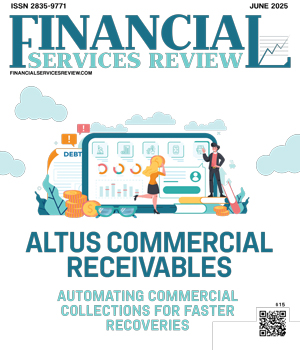Financial Services Review: Specials Magazine
Trust is the ultimate business currency, and in lending, it’s everything. Especially since the industry funnels massive data to third-party collectors, compliance and data security take precedence. Companies need an ironclad assurance to preempt sensitive consumer data theft. Altus is the perfect partner for lenders, equipping them with tools to assess risk, monitor repayment behaviors and intervene swiftly to prevent defaults. As a leading provider of commercial collections and accounts receivable management solutions, it helps businesses recover outstanding debts while ensuring compliance, data security and seamless technology integration. This is achieved through a comprehensive risk assessment tool, data-driven insights and proactive recovery strategies that prevent minor repayment issues from escalating into significant financial losses. “We provide our clients with peace of mind by offering a comprehensive solution that gives clients clear insights into their receivables,” says Jim McDermott, CEO. “Leveraging cutting-edge technology and extensive industry scale, we provide full portfolio coverage, delivering better feedback, stronger recovery rates and overall improved results.” Central to Altus’ offering is its commercial collections service, which is designed to recover outstanding debts efficiently and maintain compliance throughout. Its solution suite is built on a highly customized Salesforce-based ERP instance that stands apart by integrating with the client’s existing framework. These flexible integration capabilities enable seamless connectivity with a wide range of client platforms, from accounting software and CRM tools to financial databases. By eliminating compatibility issues caused by outdated collection systems, it helps businesses break down data silos and streamline operations for greater efficiency. The company’s system simplifies the collection process by enabling direct data exchange, eliminating the need for outdated, disconnected software. With fewer manual uploads and errors, operations run more smoothly, and clients can seamlessly transmit AR data while tracking payment statuses and case progress in real-time—ensuring full visibility and control over their receivables.
Precious Metals IRA Company of the Year 2025
Stocks, real estate and crypto investments grab headlines and dominate conversations among investors. Precious metals—gold and silver—rarely make the cut in this world of loud and volatile investments. Despite offering stability, intrinsic value, liquidity benefits diversification and a time-tested hedge against inflation, these are often pushed aside in favor of flashier, higher-risk options. This overlook stems from widespread misunderstanding and minimal education around investing on precious metals. That’s exactly what Brandon Thor, CEO of Thor Metals Group, set out to change by leading the charge to bring precious metals investing into the spotlight. With over a decade of experience as a broker, he witnessed how many investors—often first-timers—lacked guidance, overpaid or were steered toward products that didn’t align with their goals. This realization led to the establishment of Thor Metals Group. Under his leadership, the firm is committed to educating and empowering investors, providing them with a fair, ethical and transparent way to invest in precious metals and help them gain financial independence. Operating with complete integrity, Thor Metals Group helps individuals understand how to preserve their wealth against inflation, economic instability and monetary policies. It also emphasizes why true financial security means diversification—not just in stocks but in tangible assets that have stood the test of time. Above all, it shifts the financial narrative by putting investors in the driver’s seat and guiding them to reach their financial future. “We’re championing a movement for financial independence. As we expand, we aim to ignite a financial awakening and disrupt outdated thinking and equip individuals with the tools and insight they need to build lasting wealth, confidently and independently, on their terms,” says Brandon Thor, CEO. Investors Get Real Value for Their Money At Thor Metals Group, setting up Precious Metals IRA is seamless. It offers fully transparent transactions, personalized metal selections, VIP support, and a simple step-by-step process to guide clients effortlessly.
Top Financial Security Solutions Provider 2025
Despite the increasing prevalence of digital payments, check fraud continues to be a significant concern for financial institutions. Take, for example, a $3 check written at a correctional facility—this seemingly minor act set off a chain reaction that nearly resulted in financial disaster. At first, it was just a minor inconvenience. A former inmate cashed a small $3 check, and somehow, the amount ballooned to $300 by the time it reached the bank. Then it happened again. And again. And again! No matter how often the correctional facility’s financial team changed their checking accounts, the fraudsters were always one step ahead. Even though they thought they had plugged the loophole, another altered check slipped through, bleeding money from the system. The problem was never-ending, frustrating, and—worst of all—entirely out of their control. The local bank handling these transactions then dialed Cheque Guard, the ultimate solution for check fraud. The company’s secure check fraud prevention system helps small to medium-sized banks and financial institutions protect against fraud, streamline check issuance, and enhance security in financial transactions. Cheque Guard rolled out its state-of-the-art system, ensuring every check was authenticated, secured with encrypted barcodes, and embedded with advanced security markers—making alterations virtually impossible. Next, it enabled instant verification at the bank to ensure that the moment a check was presented, its authenticity was confirmed. This eliminated any chance of a $3 check being inflated to $300. Finally, the system provided fraud detection at the source and stopped fraudulent transactions right at the teller’s window instead of catching them after the damage was done. With this solution in place, the county no longer had to change its accounts constantly, the bank could verify checks in real-time, and the financial team could finally breathe easy. Instances like this is not one off. Check fraud comes in different forms, such as counterfeit checks, altered checks, forged checks, stolen checks, check kiting, remote deposit fraud, and business check fraud. “As fraudulent tactics become more sophisticated, financial institutions need to leverage a range of fraud prevention tools and tactics to combat it, and Cheque Guard leads the charge in this fight,” says Emil Ramzy, founder and CEO. While Positive Pay is very effective, it does have limitations. Here are some reasons why positive pay might not be completely effective in combating check fraud. Lack of customers participating due to difficulty of generating the issue files, most accounting systems fail short of making the preparing the issue file easy step for common users. Also, timely reply to the exceptions, businesses need to submit their decision to the exceptions, making Positive Pay an incomplete fraud prevention tool. Cheque Guard offers the Next Generation Positive Pay, that requires no issue file nor file transmission.
CXO INSIGHTS

Liquidity Risk Management in Banking-Be Prepared
Charles Levingston, EVP, Chief Financial Officer, EagleBank [NASDAQ: EGBN]

Additional Considerations in the Vendor Selection Process
Paolo del Mundo, Director of Application Security, the Motley Fool

Navigating the Talent Landscape - Redefining Leadership in Cybersecurity
Randy Raw, Chief Information Security Officer, Veterans United Home loans

Where Investments Meet Benefits Leadership Excellence
Brian Williamson, CFA, Director of Benefits and Retirement Programs, Avangrid (NYSE: AGR)
IN FOCUS
EDITORIAL
Building Financial Resilience with Smarter Strategies
Once seen as a fringe effort, battery recycling is now stepping into the spotlight and becoming a cornerstone of the electric vehicle (EV) revolution. In the United States and around the world, the automotive industry is undergoing a major shift—not only toward cleaner transportation but also toward smarter use of the resources that make it possible.
As EVs continue to rise in popularity, the demand for critical battery materials like lithium, nickel, and cobalt is growing rapidly. To manage costs, stabilize supply chains, and reduce environmental impact, automakers and suppliers are rethinking the battery lifecycle and accelerating investments in recycling.
Unlike traditional gas-powered vehicles, EVs face a challenge when their batteries degrade. But what was once considered waste is now seen as a resource. Industry leaders are partnering with recycling specialists to recover valuable minerals from used batteries, easing reliance on volatile global mining markets and helping keep materials in circulation.
Companies like Redwood Materials and Li-Cycle are expanding domestic recycling operations, enabling recovery rates of more than 90 percent. At the same time, batteries that are no longer suitable for vehicles are finding second lives in grid storage systems and lowpower applications.
This momentum is being driven by more than just innovation. Across North America and Europe, governments are tightening regulations and encouraging sustainable practices. Automakers are responding by adopting closed-loop systems that improve traceability and reduce dependence on newly mined resources.
Consumers also stand to gain. As manufacturers find new ways to recycle and reuse materials, the cost of EVs is expected to come down. And with every battery that gets a second chance, the industry moves closer to a truly circular model—one where end-of-life batteries help power the road ahead.
In this edition, we feature insights from Aaron Shaffer, Director of Marketing Services, Standard Motor Products [NYSE: SMP], and Blake Ritter, Branded Products Segment Manager, Lincoln Industries. Together, they explore how supply chain resilience and sustainability are redefining competitive advantage in automotive manufacturing.











